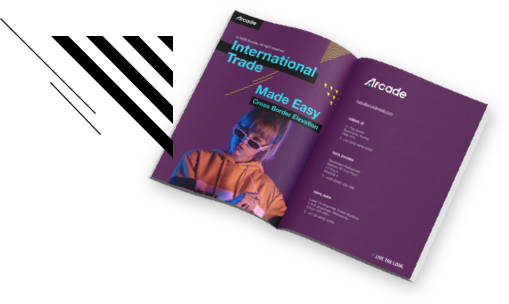Arcade offers a full merchant of record solution for brands that want to sell on UK marketplaces
UK marketplace selling
Made Easy
Enter and expand into the UK market with Arcade’s fully managed marketplace solution.
Ecommerce
Opportunity
The United Kingdom has the most advanced and most profitable e-commerce market in Europe the size of which is estimated at $280.55 billion in 2024.
$750 Billion
The UK ecommerce market is expected to reach $750.80 billion by 2029.
$85 Billion
The UK Fashion ecommerce market is expected to reach $85.51 billion by 2029.
We are living in a Marketplace Economy
- Ecommerce is growing rapidly and brands need to complement their physical stores with digital ones.
- Marketplaces are the shopping malls for the new generation and are the largest and fastest growing part of ecommerce.
- Marketplaces enable brands to reach consumers globally and provide a faster route to international markets.
- Two thirds of cross-border online shopping is currently done through marketplaces (and growing year-on-year).
Marketplaces accounted for 57% of all global online retail sales in 2019.
This figure is expected to rise to 65% by 2025.

The Problem
Selling cross-border on marketplaces is resource-intensive and is
layered with operational complexities.
layered with operational complexities.
01
Establishing contracts with each marketplace.
Creating a store for your company to sell your products on marketplaces around the world requires you to establish terms and legal contracts with those marketplaces. That also requires having a UK entity and doing the financial reconciliation each month.

02
Technically integrating to each sales channel through an API.
Once you have established a contract with a marketplace, you will need to technically integrate your real-time inventory catalogue with their seller API. As different marketplaces will have different technical infrastructures, you will need to create several integrations.

03
Providing automated data management, localised content and customer service.
When you are set up and ready to sell on marketplaces, you will need to automate your processes; as well as ensure that your listings are localised.

04
Managing cross-border shipments and returns.
As you will be selling on marketplaces internationally, you will be shipping cross-border. This requires different processes than domestic shipments such as tariffs and documentation. In addition, you will need to manage returns if the buyer is unsatisfied with their purchase.

05
Managing payments and multiple currencies.
Different countries have different currencies and buyers have varying preferences of how to pay. It’s important to manage all of these and consider the exchange rate implications.

06
Managing local taxes and other legal compliances.
Each country will have its own tax regulations and legal requirements for selling into the country. It’s important to understand the laws in the countries you wish to sell into as you could find yourself in legal trouble should you misinterpret these guidelines.

The Solution
Arcade act as the merchant of record to enable your cross-border trade strategy in the UK.
UK Strategy
Fulfilment
Returns
Localised Designs
Localised Content
Marketplaces Integration
Customer Service
Compliance
The Arcade solution incorporates D2C fulfilment
Arcade has the ability to import your products into the UK and through our sister company, Warehow, which can receive, store, pick, pack and despatch your items as well as handling customer returns.
Arcade is a fully managed, merchant of record solution, that incorporates marketplace integration, store management, financial reconciliation and fulfilment where needed.


Exporting Is Great
We Are Pentagon Group is proud to have partnered with the Exporting Is Great initiative. This offers us confidence in ensuring cross-border success for our clients in a post-Brexit environment.

ISO27001
We Are Pentagon Group has been ISO27001 accredited for three years. This is the gold standard for information security management. Clients trust us to manage their data and that of their customers.
Our Marketplaces
Arcade takes care of the importing, tax, compliance, registration, payment, and financial reconciliation issues on behalf of global brands and retailers selling into the UK.
Our technology integrates with marketplaces including:
















“Working with Arcade has been a simple process and has made it easier to work with new retail partners. Our years of working with them has led to mutual success working with a good team of people.“
Daniel Walton
CEO of Olpro
Marketplace Success Factors
Our experts have over a decade’s experience in trading and working closely with online
marketplaces. We know what it takes to be successful on marketplaces.
marketplaces. We know what it takes to be successful on marketplaces.
01
Integration
Our technology integrates directly with the marketplaces and offers unmatched speed to market.
02
Product Data
Our data optimisation teams are responsible for enriching the data to fit the requirements of each marketplace.
03
Engagement
Our customer service team takes away the complexity of managing queries and complaints.
04
Marketing
Our marketing reflects shopping events during the year, local seasons, and market conditions on the ground.
05
Product Mix
Our wide product mix enhances customer choice and presents us opportunities to up-sell your products.
06
Partnership Insights
Our established partnerships with marketplaces provide us with expert insight to dominate your category.
Our Guide


What does it take to develop a successful cross-border marketplace strategy? We’ve compiled our top 10 tips to help you achieve cross-border success.